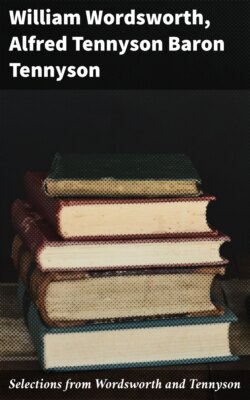Читать книгу Selections from Wordsworth and Tennyson - William Wordsworth - Страница 9
На сайте Литреса книга снята с продажи.
INFLUENCE OF NATURAL OBJECTS
ОглавлениеTable of Contents
Wisdom and Spirit of the universe!
Thou Soul, that art the Eternity of thought!
And giv'st to forms and images a breath
And everlasting motion! not in vain,
By day or starlight, thus from my first dawn 5
Of childhood didst thou intertwine for me
The passions that build up our human soul;
Not with the mean and vulgar works of Man:
But with high objects, with enduring things,
With life and nature: purifying thus 10
The elements of feeling and of thought,
And sanctifying by such discipline
Both pain and fear—until we recognize
A grandeur in the beatings of the heart.
Nor was this fellowship vouchsafed to me 15
With stinted kindness. In November days,
When vapors rolling down the valleys made
A lonely scene more lonesome; among woods
At noon; and 'mid the calm of summer nights,
When, by the margin of the trembling lake, 20
Beneath the gloomy hills, homeward I went
In solitude, such intercourse was mine:
Mine was it in the fields both day and night,
And by the waters, all the summer long.
And in the frosty season, when the sun 25
Was set, and, visible for many a mile,
The cottage windows through the twilight blazed,
I heeded not the summons: happy time
It was indeed for all of us; for me
It was a time of rapture! Clear and loud 30
The village clock tolled six—I wheeled about,
Proud and exulting like an untired horse,
That cares not for his home—All shod with steel
We hissed along the polished ice, in games
Confederate, imitative of the chase 35
And woodland pleasures—the resounding horn,
The pack loud-chiming, and the hunted hare.
So through the darkness and the cold we flew,
And not a voice was idle; with the din
Smitten, the precipices rang aloud; 40
The leafless trees and every icy crag
Tinkled like iron; while far-distant hills
Into the tumult sent an alien sound
Of melancholy, not unnoticed, while the stars,
Eastward, were sparkling clear, and in the west 45
The orange sky of evening died away.
Not seldom from the uproar I retired
Into a silent bay, or sportively
Glanced sideway, leaving the tumultuous throng,
To cut across the reflex of a star; 50
Image, that, flying still before me, gleamed
Upon the glassy plain; and oftentimes,
When we had given our bodies to the wind,
And all the shadowy banks on either side
Came sweeping through the darkness, spinning still 55
The rapid line of motion, then at once
Have I, reclining back upon my heels,
Stopped short, yet still the solitary cliffs
Wheeled by me—even as if the earth had rolled
With visible motion her diurnal round! 60
Behind me did they stretch in solemn train,
Feebler and feebler, and I stood and watched
Till all was tranquil as a summer sea.
1–14. In what other poems does Wordsworth describe "the education of nature?"
8. Nature's teaching is never sordid nor mercenary, but always purifying and ennobling.
10. PURIFYING, also SANCTIFYING (l. 12), refer to "Soul" (l. 2).
12–14. Human cares are lightened in proportion to our power of sympathising with nature. The very beatings of our heart acquire a certain grandeur from the fact that they are a process of nature and linked thus to the general life of things. It is possible that "beatings of the heart" may figuratively represent the mere play of the emotions, and thus have a bearing upon the words "pain and fear" in line 13.
15. FELLOWSHIP. Communion with nature in her varying aspects as described in the following lines.
31. VILLAGE CLOCK. The village was Hawkshead.
35. CONFEDERATE. Qualifies "we," or "games." Point out the different shades of meaning for each agreement.
42. TINKLED LIKE IRON. "When very many are skating together, the sounds and the noises give an impulse to the icy trees, and the woods all round the lake tinkle." S. T. Coleridge in The Friend, ii, 325 (1818).
42–44. The keenness of Wordsworth's sense perceptions was very remarkable. His susceptibility to impressions of sound is well illustrated in this passage, which closes (l. 43–46) with a color picture of striking beauty and appropriateness.
50. REFLEX=reflection. Cf.:
Like the reflex of the moon Seen in a wave under green leaves. Shelley, Prometheus Unbound, iii, 4.
In later editions Wordsworth altered these lines as follows:
To cut across the image. 1809. To cross the bright reflection. 1820.
54–60. The effect of rapid motion is admirably described. The spinning effect which Wordsworth evidently has in mind we have all noticed in the fields which seem to revolve when viewed from a swiftly moving: train. However, a skater from the low level of a stream would see only the fringe of trees sweep past him. The darkness and the height of the banks would not permit him to see the relatively motionless objects in the distance in either hand.
57–58. This method of stopping short upon one's heels might prove disastrous.
58–60. The effect of motion persists after the motion has ceased.
